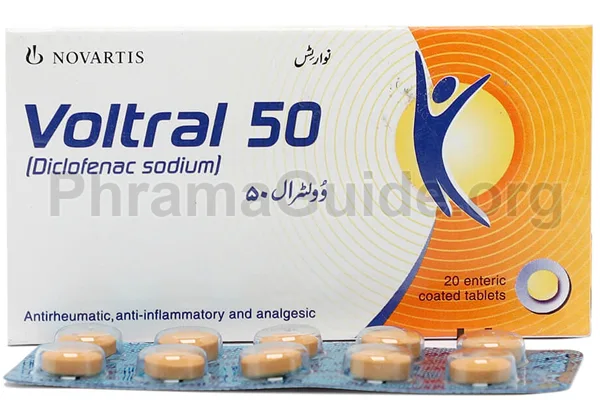Voltrl is a nonsteroidal anti-inflammatory drug (NSAID) commonly used to relieve pain, inflammation, and swelling associated with various conditions, including arthritis, injuries, and post-operative pain. Like many medications, Voltral can have side effects, and these can vary in frequency and severity. Common and less common side effects of Voltral may include:
Common Side Effects
- Gastrointestinal Upset: Stomach discomfort, indigestion, heartburn, and nausea are some of the most common side effects associated with Voltral.
- Diarrhea or Constipation: Changes in bowel habits, including diarrhea or constipation can occur while using Voltral.
- Abdominal Pain: Some people may experience abdominal pain or cramps with Voltral.
- Headache: Headaches are a common side effect of Voltral.
- Dizziness: A feeling of lightheadedness or dizziness may occur, particularly when standing up quickly.
- Skin Rash: Skin reactions such as rashes or itching are possible side effects, though they are generally not severe.
Less Common Side Effects
- Gastrointestinal Ulcers and Bleeding: Voltral can increase the risk of developing ulcers in the stomach or intestines, which can lead to gastrointestinal bleeding. This is a more serious side effect and requires immediate medical attention.
- Increased Blood Pressure: Some people may experience an increase in blood pressure while taking Voltral.
- Kidney Problems: Voltral can affect kidney function and lead to kidney problems, which may manifest as changes in urination, swelling, or fatigue.
- Liver Problems: Rarely, Voltral can affect liver function and lead to liver problems, including jaundice (yellowing of the skin and eyes).
- Allergic Reactions: Serious allergic reactions, such as difficulty breathing, swelling of the face, lips, or tongue, or hives, are rare but require immediate medical attention.
- Fluid Retention: Some individuals may experience fluid retention, which can lead to swelling in the feet, ankles, or legs.

What is Voltral?
Voltral is one of the leading brands of Diclofenac Sodium, manufactured and marketed by Novartis, Pakistan.
Voltral : Available Formulations and Strengths
Prsently, Voltral is available in Tablets, Injection, and Gel (Emulgel) Forms
Voltral Tablets : 25mg, and 50mg strengths
Voltral Tablet SR : 100mg strength
Voltral Gel (Emulgel) : 1%w/w strength
What Are The Possible Drug Interactions of Voltral?
- Other NSAIDs: Concurrent use of multiple NSAIDs, including ibuprofen, naproxen, or aspirin, can increase the risk of side effects, including gastrointestinal bleeding and ulcers.
- Anticoagulants (Blood Thinners): Voltral can enhance the anticoagulant effects of medications like warfarin or heparin, increasing the risk of bleeding. Your doctor may need to adjust your anticoagulant dose if you are prescribed both.
- Antiplatelet Medications: Medications like aspirin or clopidogrel that reduce platelet function and help prevent blood clots can have an increased risk of bleeding when used with Voltral.
- Selective Serotonin Reuptake Inhibitors (SSRIs) and Serotonin-Norepinephrine Reuptake Inhibitors (SNRIs): Using Voltral with SSRIs or SNRIs may increase the risk of gastrointestinal bleeding. These medications include drugs like fluoxetine, sertraline, and venlafaxine.
- Corticosteroids: Combining Voltral with corticosteroids can increase the risk of gastrointestinal bleeding and ulcer formation.
- ACE Inhibitors and Angiotensin II Receptor Blockers (ARBs): Voltral may reduce the effectiveness of ACE inhibitors and ARBs, which are used to treat high blood pressure and heart failure.
- Diuretics (Water Pills): The combination of Voltral and diuretics may reduce the blood pressure-lowering effects of diuretics and increase the risk of kidney problems.
- Lithium: Voltral can increase lithium levels in the blood, which may lead to lithium toxicity.
- Methotrexate: Concurrent use of Voltral and methotrexate, commonly used in rheumatoid arthritis, may increase the risk of methotrexate toxicity.
- Cyclosporine and Tacrolimus: Voltral can affect the blood levels of these immunosuppressive medications, which are used in organ transplant patients.
- Quinolone Antibiotics: There is a potential for increased risk of seizures when Voltral is used with certain quinolone antibiotics.
- Anti-diabetic Medications: Voltral may affect blood sugar levels, potentially interacting with oral antidiabetic medications or insulin.
- Alcohol: Consuming alcohol while taking Voltral can increase the risk of gastrointestinal bleeding and ulceration.
- Herbal Supplements: Some herbal supplements, such as ginkgo biloba and garlic, can increase the risk of bleeding when used with Voltral.

Leave A Comment